Four Stories from the Field: Of Tamil villages, the Soligas, Richard, and the Tibetans
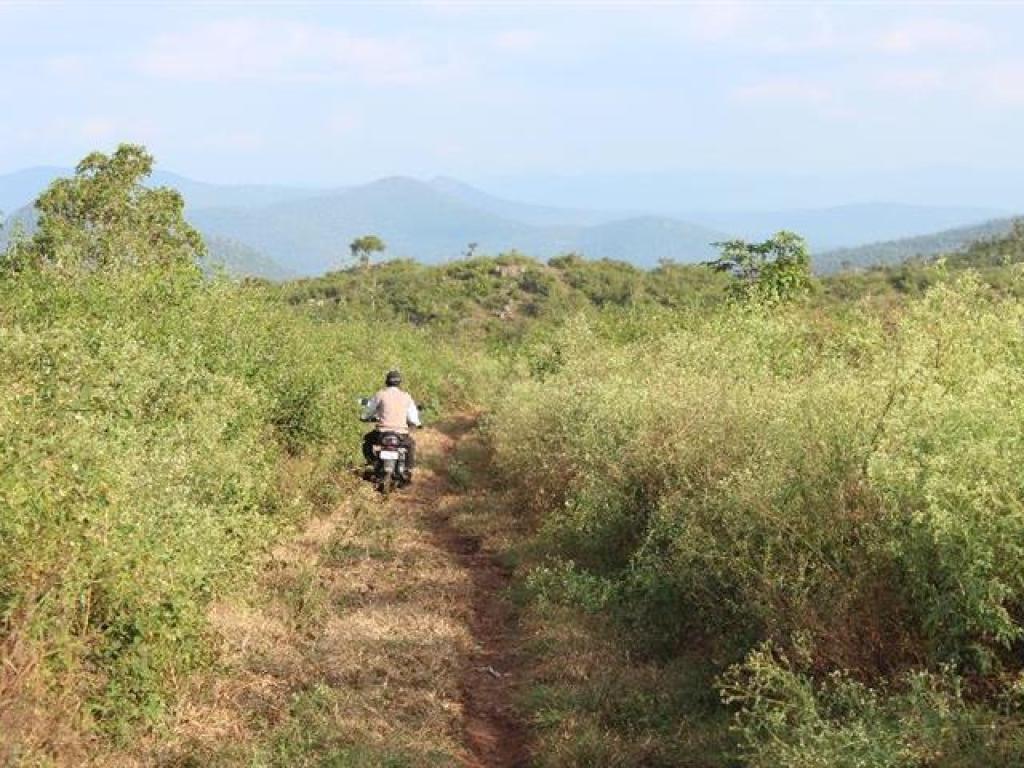
by Pranietha Mudliar, Intern, IIHS and Doctoral Researcher, School of Environment and Natural Resources, Ohio State University
One advantage of being an intern in the ASSAR project is that I can also undertake fieldwork for my doctoral degree. My research examines the contentious debate of how heterogeneity affects collective action. I aim to contribute to this debate by studying whether institutions can moderate the influence of heterogeneity for collective action. I travelled from Tamil Nadu to Karnataka over the span of three weeks in search of a suitable case for my research. Finally, in Odeyarpalya, Karnataka I found a case that matches the variables of my interest. Residents from two villages, Arepalya and Bailur, have formed the AB Prakruti Watershed Organization in Odeyarpalya for water management.
The watershed organization has members from different caste as well as villages making it a heterogeneous group. It has been successfully functioning since the mid 1990s, making it a good case for me to examine what kinds of institutions have enabled a heterogeneous group to undertake successful collective action. For ASSAR, my research will be examining the institutional arrangements in vulnerable communities and comparing whether vulnerable communities in Tamil Nadu have institutions for water management.
My field site, Odeyarpalya, is one of the most fascinating sites that I have encountered for research in terms of diversity of people. Before zeroing in on Odeyarpalya in Kollegal, Karnataka as my field sites, I had no clue that I would meet a Tamil-speaking village in Karnataka, the Soliga tribes, one Ugandan, and one Tibetan community. This blog has four stories to celebrate diversity; all unrelated to each other, but tied together in that they all occupy the same landscape.
Kudduvale
The first story is about the Tamil speaking community in Kudduvalle. Villages located on state borders are interesting places because people here are bound to speak at least two languages. Having previously done fieldwork in another village that bordered Karnataka and Maharashtra, I have realized that residents from such villages also have strong notions of identity based on language. The village of Kudduvalle was one such place. Geographically, it is located in Karnataka, but linguistically people prefer to converse in Tamil. They belong to the Ballala caste, which is considered an upper caste in Tamil Nadu, but has scheduled caste status in Karnataka. The villagers consider themselves to be from the upper caste. A few Soligas also live in the village but their settlements are situated away from the settlements of the Ballalas. The Soligas speak only Kannada, and work as labourers on the farms of the Ballalas.
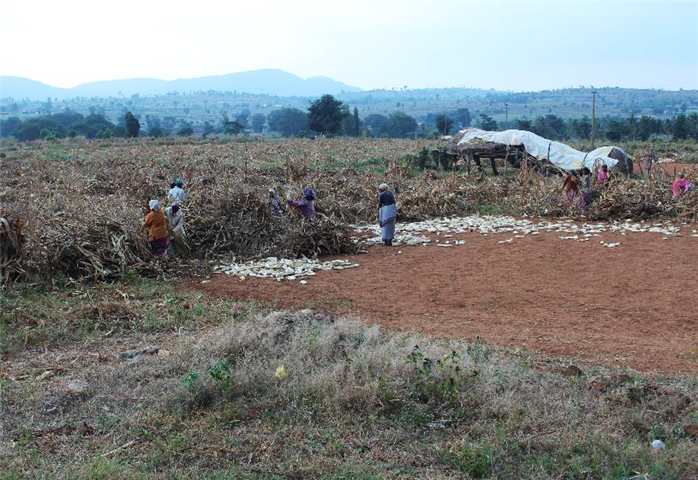
Harvesting Maize, at Kudduvalle. Soligas are hired to harvest crops in Kudduvalle.
Eventually, I did not choose Kudduvalle as a site for my research because it did not match the variables that were relevant to my research. Nonetheless, Kudduvalle could be a potential research site for ASSAR to examine interactions of vulnerable groups such as the Soligas with the Ballalas, and how these interactions are shaping in a changing political climate, especially since government interventions are trying to integrate the Soligas from the Biligiri Rangaswamy Temple (BRT) hills into villages.
The Soligas
While there is plenty of literature about the Soliga tribes living in the Biligiri Rangaswamy Temple (BRT) hills, this is the first time that I have seen instances of the Soligas integrating into villages and taking up agricultural activities. Some Soligas have been awarded land pattas (rights) and now practice agriculture as well as collect non-timber forest products (NTFPs) such as honey. My field assistant explained how the Soligas are divided into five major groups each with further sub-groups. During our way to the village common lands, we encountered a Soliga carrying a lot of heavy firewood on her head. My field assistant stopped her and asked her to explain the differences between these groups. She told us about two of the Soliga groups; she was from the Urali Soliga group who speak both Kannada and Tamil because they live on the border that separates Karnataka and Tamil Nadu. She said that they still depend on the forest for their livelihood. The Soligas whom I met in Kudduvalle are the Male Soligas who only speak in Kannada. A few of them have been granted pattas for their land by the Forest Department. Regardless of the pattas, the Soligas continue to remain one of the most vulnerable populations in this semi-arid landscape.
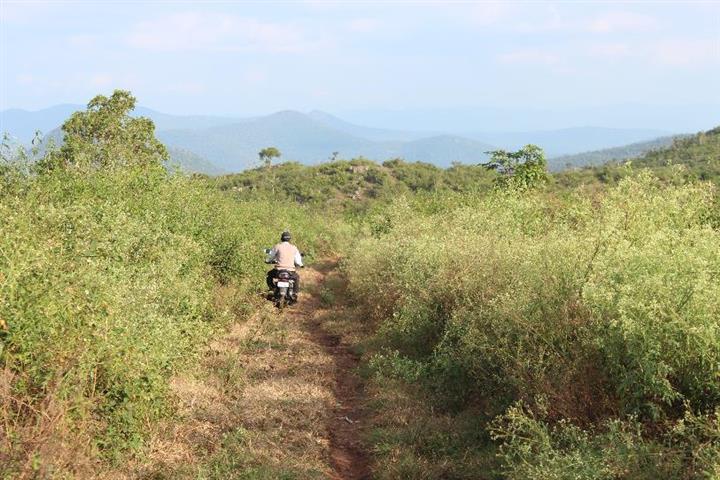
Hiking across the commons. I got off the motorbike because I fell down in a trench.

An Urali Soliga settlement at the border of Karnataka and Tamil Nadu
Richard
The next story is about my Ugandan neighbor, Richard who occupied the room next to mine at the training office of the Mysore Rehabilitation and Development Agency (MYRADA) that was hosting me for my fieldwork. Richard is part of the exchange program that MYRADA facilitates with developmental organizations in Uganda. In India, Richard will receive training on the functioning of self-help groups (SHGs), operating and maintaining funds, and developing alternative livelihood skills, all of which he will take back with him to Uganda. What I found inspiring was the remarkable enthusiasm with which Richard was preparing to live in rural India for the next 11 months, especially where he faces a significant language barrier.
With no access to appetizing food and no communication with my family and friends, the first three days of my stay at my field site were challenging. The closest town was 1.5 km away, and was unsafe for me to walk alone. The caretaker at the training office would go to the town on his motorbike and bring me breakfast, lunch, and dinner, all of which made me sick because the primary ingredient in the dishes was sodium bicarbonate. Richard was in Mysuru for Christmas, the day I arrived in MYARA. He arrived at MYRADA three days after I arrived. Seeing my plight, he offered to cook me a meal and invited me to accompany him to the town for purchasing the ingredients. During the walk, Richard taught me some phrases in Kannada, and all I could do was marvel at the irony of a Ugandan teaching a Tamilian born in Maharastra how to speak in Kannada! That afternoon, I had my first good meal in 10 days - a grand chicken meal that had flavors from Uganda as well as from India because of some very eager assistance from the very vegetarian caretaker!
Richard and I became good friends. Richard was missing home, and his three little children, the youngest of which was just born a few weeks before he moved to India. Electricity and Internet are hard to come by in Odeyarpalya, so his contact with his family is limited to weekly phone calls. Nonetheless, for the next 11 months, he has to learn to communicate with the locals. He diligently notes down words in a notebook that he carries around.

With Richard and the staff at MYRADA during the New Yearâs Eve Celebrations
In the 11 days that I spent in the field, the loss of Internet struck me hard because I was cut off from my friends and family. I had no form of entertainment other than reading academic articles on my computer. One sleepy afternoon, Richard and I decided to break the monotony of our routine by taking a walk around Odeyarpalya. We met kids who were overjoyed to see Richard because he would happily greet them with a âNamaskaraâ. We met a kind man with a rooster and a kitten, who allowed his kitten to climb my back. We met our caretakerâs son who went ballistic on seeing us near his home. Some school kids that Richard knew spotted him from the bus, and nearly threw themselves out of the window in sheer excitement. Everywhere we went we were met with curious eyes, and some friendly people would come up and ask about us. They insisted that we should accompany them to their homes for a quick snack. It was one of the best afternoons that Iâve ever spent. Our social life in Odeyarpalya just went up by several hundred notches! I am now looking forward to returning back to Odeyarpalya in the summer to spend an extended time for my fieldwork.
The Refugees
The Dhondeling Tibetan Refugee Colony was established in Odeyarpalyam in the early 1970s with around 2000 people. Exiled from Tibet, the Tibetans found their way in a refugee colony established by MYRADA. Today, their population exceeds 5000 people. They now hold ration cards, are included in the public distribution system but lack citizenship status in India. They cultivate crops such as maize, ragi, and potatoes but do not own the land that they farm. Some of them knit sweaters that are sold in big cities such as Mysuru and Bengaluru. There are three monasteries in the colony, and the 14th Dalai Lama visited the colony in 2009.
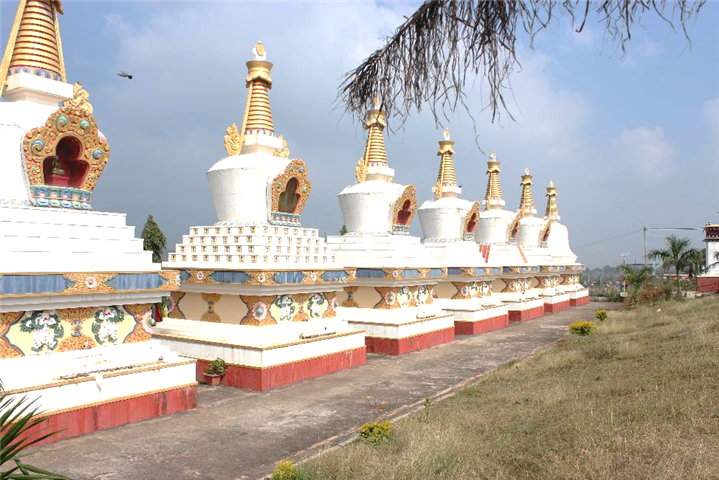
One of the Tibetan monasteries in Odeyarpalya
I was amazed by what I saw. On passing through their land, I noticed that they make a living out of one of the most unforgiving of terrains. The main road separates the Tibetan side from the local side. The Tibetan houses are all built out of cement, each one having a front yard. They have a local self-government in Dhondeling, and also a Tibetan school affiliated to the Central Board of Education (CBSE). Although, I did not have the opportunity to speak with any of the Tibetans, in my next visit in May, I plan to go meet with the local self-government and mingle with the residents. I think this is the one place that is teeming with untold stories, waiting for exploration.
In writing about Kudduvalle, the Soligas, Richard, and the Tibetan Refugees, I have relived my experiences, which have once again, made me itch to start fieldwork right away. In a few months, I will be back in this landscape - a landscape that holds so much diversity within it, and then find my place in it.
I Now Speak Tamil, My Mother Tongue
My mother tongue is Tamil. I am notorious in my family for speaking an appalling version of Tamil. My inability to converse fluently in Tamil, however, has never particularly ashamed me. Nonetheless, instances where I had to speak in Tamil have been quite painful, as I have struggled to find words and keep the conversation going. Little did I know that my fieldwork stint from December 2014 to January 2015 would present me with no option, but to only communicate in Tamil. Tamil speaking residents dominated the villages that I chose for my fieldwork. Somewhere, somehow the Universe was determined to make sure that I do learn to speak my mother tongue, properly!
My research entails examining decision-making in community-based natural resource management organizations. I ask questions pertaining to how community members make decisions, how do they interact with one another, and what kinds of institutions such as rules, strategies, and norms structure these interactions? I realized that speaking in broken Tamil is one matter, but conducting an interview in Tamil is a whole different ball game.
Slowly I learned. I learned that if I stay calm enough, even words that I did not know existed in the deep recesses of my mind come forth. I surprised myself. In the past, several people have mocked my broken Tamil skills, which made me resist any attempts to learn the language. However, the villagers were kind. Without the needless pressure of being laughed at, coupled with constant encouragement, I conducted my interviews. After a couple of interviews, my field assistant did not have to intervene as much. I learned new words during my interviews, and proudly used them in the next interview.
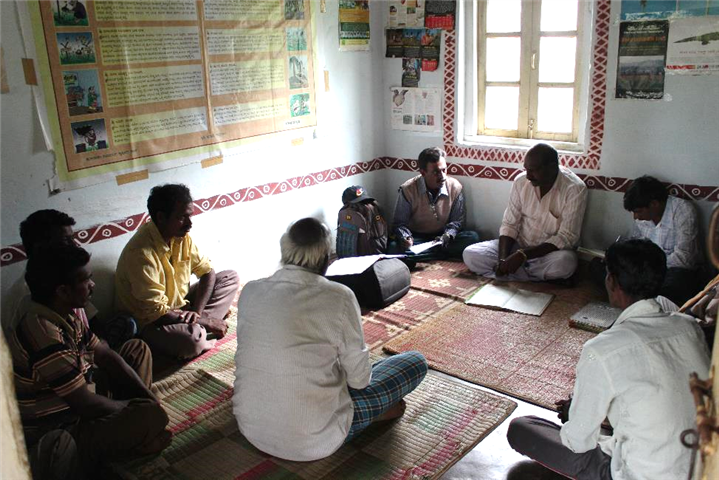
Focus group discussion with my interviewees as Arepalyam
One of the takeaways from my coursework in Research Methods was that fieldwork immersion always results in a researcher learning something extraordinarily valuable. While I had been prepared to âlearnâ only with respect to collecting data for my research, I had never envisioned rediscovering and revisiting my native language. After conducting an hour-long interview in Tamil without the aid of my field assistant, I noticed a sudden surge of pride in myself. The satisfaction was not because I could speak without anyoneâs prompting, but because I could conduct a real conversation with ease, without any fear of mockery. In the life of a student, fieldwork is considered to be one of the most rewarding phases, and I, for one, am just beginning to discover that learning comes in from the unlikeliest of sources and at the most unlikeliest of times!